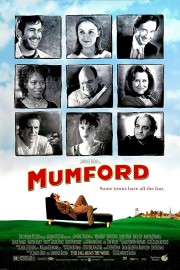Mumford
I’ve been going to therapy for a decade. In that time, I’ve seen primarily one therapist. I’m not sure how I would feel if they, out of the blue, told me they were not actually licensed to practiced. Since they are involved with a larger practice, and not on their own, that would be unlikely, but I couldn’t help but wonder about that rewatching Lawrence Kasdan’s “Mumford” for the first time in nearly 20 years. Of course, just admitting that is a big spoiler to the film, but in seeing it again, I feel like “Mumford” could stand up as a solid and engaging film even with that awareness, because it has more on its mind than just a big twist.
Kasdan is one of the most important writers my generation of film fans have had, having co-written “The Empire Strikes Back,” “Return of the Jedi,” “The Force Awakens” and “Solo,” along with “Raiders of the Lost Ark.” But it’s important to also see his other work as a writer, and writer-director, to get a feeling for why he matters as a film voice. Some of his most well-known efforts (“The Big Chill,” “Silverado”) are awaiting their turn in my film viewing, but “Body Heat,” “The Accidental Tourist,” “Mumford,” and even “Dreamcatcher” are all good looks at how character and old-school storytelling mean something to Kasdan, as each film fits into a particular genre from Hollywood’s golden era. They don’t always work in and of themselves, but they always show affection and craft that is admirable.
Back to “Mumford.” Here, Kasdan finds himself delving into Frank Capra-like stories of small towns, unlikely love, and good intentions under attack. Dr. Mumford is a psychologist in a small town called Mumford, and from the second we first see him with patients like Pruitt Taylor Vince’s Henry, who speaks of melodramatic, lusty love affairs he fantasizes of, or Zooey Deschanel’s celebrity-obsessed Nessa, we notice not only a particular ability to pinpoint his patient’s issues and an uncanny ability to listen, there are also unconventional choices he makes that give you the impression he’s not quite aware of the full ethical responsibility of psychologists. He lives with a local restaurant owner (Alfre Woodard) and is well-liked by his patients, including a tech mogul (Jason Lee) whom wants to meet with him under the guise of friendship, but has insecurities of his own. During those meetings, he feels comfortable enough to tell Lee’s Skip a big secret, and one that leads to some real dilemmas down the road.
Mumford is played by Loren Dean, an actor I first remembered from “Apollo 13” in a smaller role, but he’s also been in more prominent roles in “Gattaca,” “Space Cowboys” and the TV show “Bones.” Dean is a good choice for this role by Kasdan, as he is amiable and charming, but very relatable, as well, in the way you think of Jimmy Stewart in his films with Capra. Mumford is not a con man, or maliciously cruel, but just a person on his own emotional journey throughout the film, and Dean makes that clear in every moment we see him with his patients, including a young woman (Sofie, played by Hope Davis) who is having difficulty keeping herself motivated. That’s one of the things I really like about Kasdan’s film, because it may turn of a somewhat-conventional plot twist, but it ultimately is about a story of a young man who found himself at a bad place in his life, and found a way out of it by genuinely trying to help other people. Sure, his choices are misguided, and rightfully punished, but he’s got a good heart, and it’s one of the things that makes Kasdan such a smart writer- he finds flaws in people, but doesn’t judge them on their choices, and allows us to decide whether they deserve to be judged or not, and how we feel about that. Going back to my first paragraph a bit, I do think I would feel the sting of betrayal some of Mumford’s patients do if my therapist was not who they seemed, but I also would have a hard time being anything but grateful for what they’ve done to help me over the years. Kasdan nails the double-edged sword flawed people have to balance, every once in a while, and it’s why he’s such a great storyteller.










